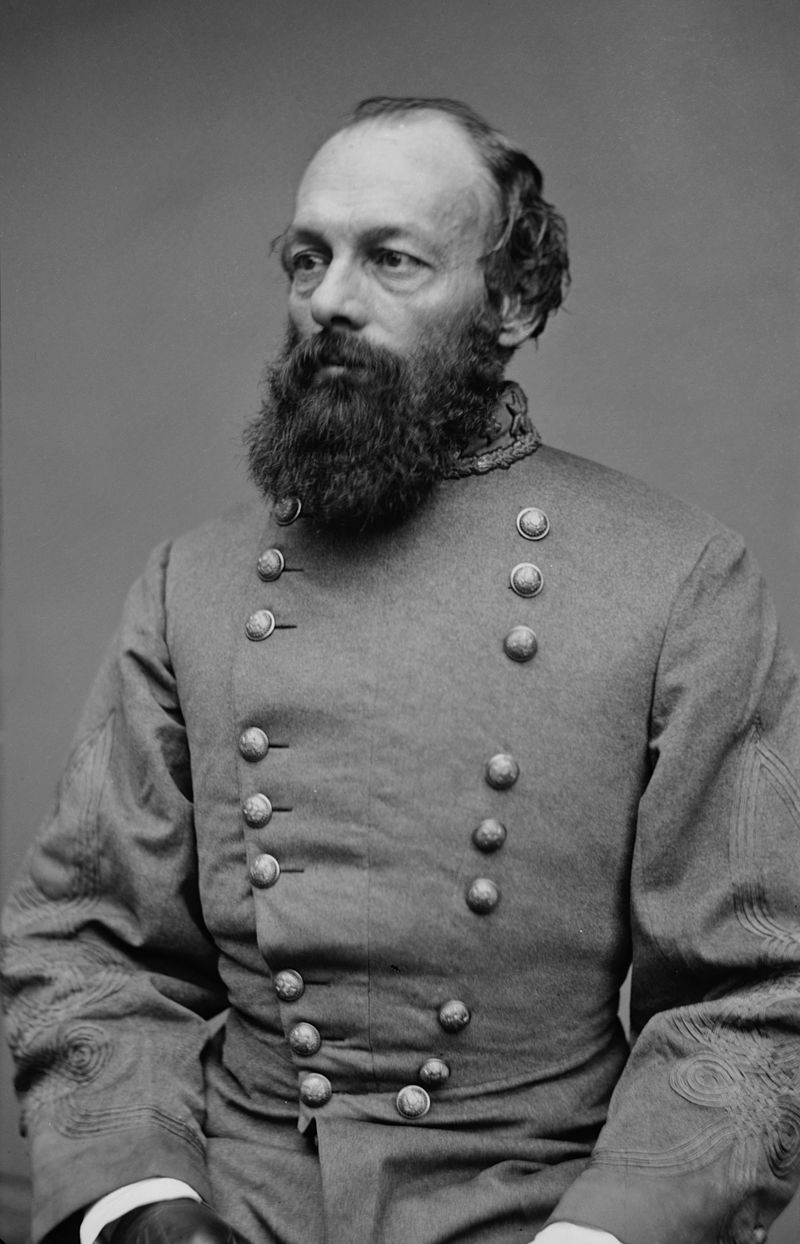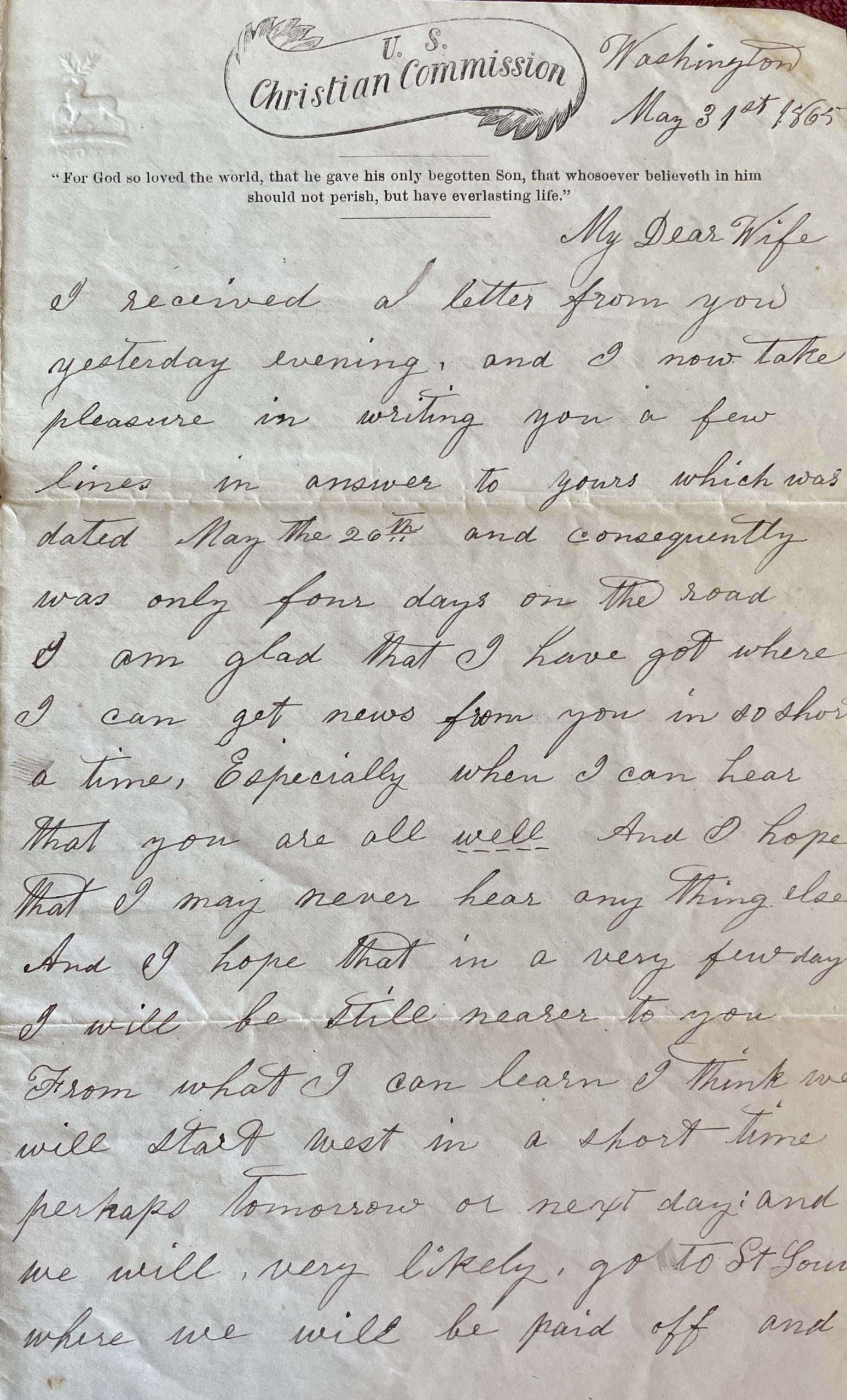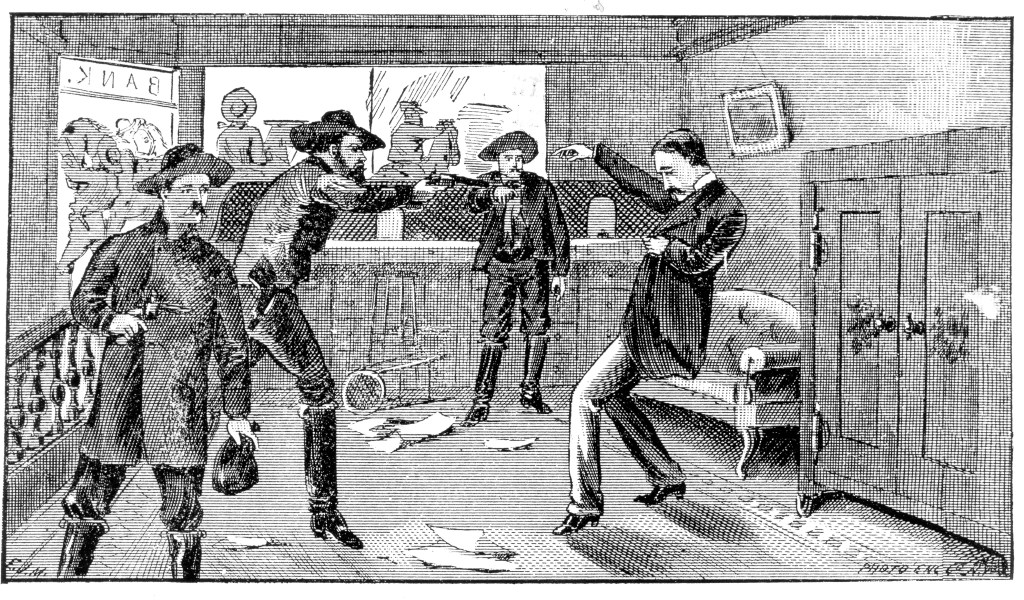It Didn’t End with Lee’s Surrender at Appomattox: A Look at the Surrenders of Gen. Joseph Johnston and Gen. Kirby Smith on April 26 and May 26, 1865 – Part II

In Part I of this post, I shared an excerpt from my book A State Divided: The Civil War Letters of James Callaway Hale and Benjamin Petree of Andrew County, Missouri, describing the surrender of Confederate Gen. Joseph Johnston to Union Gen. William Tecumseh Sherman on April 26, 1865. Here, I discuss another significant surrender that did not occur until a full month later: that of Confederate Gen. Kirby Smith, commander of the Trans-Mississippi Department.
Both Hale and Petree, in two of their final letters, mention significant events that occurred in the weeks following Lee’s surrender at Appomattox. In a letter dated May 14, 1865, from the Marine Hospital in St. Louis, Missouri, Hale – who was serving in the Veteran Reserve Corp at Benton Barracks – writes:
We have good news here this morning. They have captured Jeff Davis and some men of his crew on the 10th at Irwinville, Georgia. I hope he will get his just dues. I don’t think the war will last much longer. They is a talk of discharging all the soldiers but the Regulars by the first of June, and that is close by. They have not paid none of the soldiers off yet, so I think by that we will all be discharged… That was a bad accident happened with them soldiers coming down.
The “bad accident” Hale refers to is the disaster involving the steamboat Sultana, which has been called “the worst maritime disaster in American history” (1). On April 27, 1865, the Sultana was heading north, carrying 2,200 men and 60 horses and mules, when the ship’s boilers exploded seven miles above Memphis. More than 1,500 people died in the explosion – many of them newly released Union prisoners of war on their way back to their families.
In happier news, as Hale reported in the same letter, Confederate President Jefferson Davis had been captured by Union soldiers in Irwinville, Georgia, on May 10 as he and his wife were on their way to book passage overseas. He was later indicted for treason and imprisoned for two years at Fort Monroe, Virginia, before being released on parole in May 1867.
Davis, along with his cabinet, had fled the capital city of Richmond on April 2, one day before its fall. While most Confederate commanders admitted the war was at an end and laid down their arms soon after Lee’s surrender at Appomattox, Davis and his cabinet vowed to continue fighting. Into early May, Davis and a few other Confederate commanders and political leaders – mostly in the Trans-Mississippi Theater – were still urging Confederates to fight through means of guerrilla warfare. That fighting finally came to an official end on May 26.
In one of his final letters to his wife dated May 31, 1865, from Washington, Kentucky, Petree – serving in the 18th Regiment, Missouri Infantry – writes about this belated surrender:
From what I can learn, I think we will start west in a short time, perhaps tomorrow or next day; and we will likely go to St. Louis, where we will be paid off, and we will very soon be discharged and sent home…. Kirby Smith has surrendered, and I cannot see any necessity for keeping so large an army any longer than till they can be paid off and discharged.

It took many weeks for the news of the surrenders in the east to reach Confederate troops and guerrillas still active in the west. One of those who continued fighting was St. Joseph, Missouri’s former mayor, Jeff Thompson, now commander of the Northern Sub-District of Missouri, whose previous actions in Missouri’s northwest I discuss in chapter 2 of A State Divided.
Finally contacted by Union commanders offering him the same terms given to Lee if he would surrender, Thompson sent the following reply from Harrisburg, Arkansas, on April 30, 1865, to Union Maj. Gen. J.J. Reynolds:
General: Your favor of the 18th instant, inclosing a copy of your communication to Maj. Gen. J. F. Fagan, has this instant reached me. Being disposed to believe that you are actuated by philanthropic principles in making these propositions, or are acting in conformity to orders, I receive them in more kindness that I otherwise would, but I respectfully and most positively decline accepting your offer. While frankly admitting that the news that has reached me of the condition of the Confederate cause in Virginia is very discouraging, yet believing firmly in the justness of our cause and our ability to succeed in the course of time, I will march firmly on in the path of my duty until my Government or superior officers shall bid me stop, which I hope and pray will never be until the Southern people are a free and independent nation. I regret exceedingly the necessity of sacrificing more “brave men,” and mourn for the suffering of our people, but it seems only thus that it is possible to gain our independence, and we must meet the shock and bear the brunt as our forefathers did in ’76, and I therefore cheerfully bear my portion of “the responsibility” and will abide the consequences.
I have the honor to be, general, very respectfully, your obedient servant,
Jeff Thompson, Brigadier-General, Commanding
P.S. Allow me to express my sincere regret and horror at the manner in which President Lincoln came to his death (2).
As late as May 5, according to one official letter, both Thompson and Fagan, who commanded the District of Arkansas, “decline[d] to surrender” (3). Just a day later, however, Thompson was reported to be on his way to Jacksonport with a flag of truce. On May 10, Lt. Col. C. W. Davis in Chalk Bluff, Arkansas, wrote to Maj. Gen. Grenville Dodge, commander of the Department of the Missouri: “Brig. Gen. Jeff Thompson is in our camp. He is a witty fellow, and is continually talking about impossibilities. He has not yet decided whether to surrender or not. Shall try to convince him. If he gives up it will [be] hard to find his army” (4).
Davis must have been persuasive, for on May 11, Thompson surrendered his troops – at least those who had not deserted or fled with Gen. Joseph O. Shelby and Gen. Sterling Price to Mexico rather than surrender – to Dodge at Chalk Bluff, Arkansas. They were paroled on May 29 at Jacksonport and June 5 at White River in Arkansas, with some bushwhackers hiding out in northern Arkansas likely taking advantage of the opportunity to surrender as part of his command.
Confederate deserters presented a dilemma for Union forces in the Trans-Mississippi theater. They were turning themselves in “at the rate of five per day, a majority of these men … utterly destitute … [claiming] to have been conscripted by [Confederate Gen. Sterling] Price during his raid into Missouri, and to have homes in that State, to which they are anxious to return…. They [were] all anxious to take the oath and leave the rebel army” (5).
Many Confederate bushwhackers simply headed north. Reported guerrilla sightings poured in, describing their suspected movements and criminal acts, as well as recounting the number killed – for many became targets upon their return. There was confusion among Union leaders as to how guerrillas should be treated. In a letter dated May 7, Maj. Gen. G.M. Dodge in St. Louis wrote to Col. Chester Harding, Jr., advising: “In reference to your letter relative to bushwhackers who desire to give themselves up, you can say to all such who lay down their arms and surrender and obey the laws that the military laws will not take any further action against them, but that we cannot protect them against the civil law should it deem best to take cognizance of their cases. It is useless for them to continue the contest, and sooner or later they will be caught, and no terms will be granted them” (6).
The majority of guerrillas surrendered peacefully. Others, like notorious Missouri guerrilla leader William Clarke Quantrill, did not. Guerrillas like Quantrill faced a dilemma: “Public opinion had turned against the raiders. Considered guerrillas and not recognized as legitimate soldiers…. Viewed as outlaws, Quantrill’s men faced certain death if captured in Missouri” (7). Quantrill was shot in Kentucky on May 10 and died one month later. Some of his followers who did return to Missouri “pursue[d] a relentless guerrilla warfare, private revenge and plunder being their motive” (8). Brothers Frank and Jesse James and Cole and Jim Younger, for example, targeted people and institutions who supported the Union with many of their bank robberies.
In one of their earliest confirmed robberies, the gang robbed Daviess County Savings Bank in Gallatin, Missouri, on December 7, 1869. During the robbery, one of the men shot and killed the cashier, Capt. John W. Sheets: “The story goes that Jesse James killed Sheets because he thought he recognized him as the man who had killed ‘Bloody Bill’ Anderson just before the end of the war. Actually, the man responsible for killing Anderson was Major S. P. Cox, who also lived in Gallatin. Unfortunately, Captain Sheets looked a little like Cox” (9).

Other bushwhackers fled to Texas, where the largest remaining Confederate army – estimated at 60,000 in Spring 1865 – still served under the command of Gen. Edmund Kirby Smith. Some Confederates in Texas held out hope of making Texas a republic once again. Some were hoping for aid from Mexico or France. Some hoped to establish colonies in Mexico. The last battle of the Civil War, fought in Texas at Palmito Ranch near Brownsville on May 13, ended in a Confederate victory.
As late as May 16, according to a letter from Maj. Gen. Lew Wallace to Lieut. Gen. U.S. Grant, “General E. Kirby Smith … refused to surrender and urged his soldiers to hold out, as they have means to maintain themselves until assisted from abroad” (10). Even more, according to Wallace, Smith was suspected of having secret negotiations with Maximilian I, an Austrian archduke who became emperor of the Second Mexican Empire in 1864. Wallace told Grant, “I cannot do otherwise than believe that there is a secret arrangement existing between the Mexican Imperialists and the Texan Confederates, contemplating ultimate annexation of Texas and mutual support, or the support without the annexation” (11).
Finally, however, Smith – commander of the Trans-Mississippi Department, which included Arkansas, Missouri, Texas, western Louisiana, Arizona Territory, and the Indian Territory – surrendered to Union Gen. Edward Canby in New Orleans, Louisiana, on May 26. Smith’s troops, totaling 43,000 at the time of his surrender, had been cut off from other Confederate troops since the capture of Vicksburg.
The surrender was actually arranged by Confederate Lt. Gen. Simon Bolivar Buckner, since Smith had already left Louisiana for Texas. On June 2, Smith signed the terms of surrender in Galveston, Texas, and laid down his arms before fleeing to Mexico to avoid being prosecuted for treason. He later fled to Cuba, but eventually returned to Virginia in November of 1865 to sign the amnesty oath.
Many believe the Civil War ended with Lee’s surrender at Appomattox Court House on April 9, 1865. The ongoing events and significant concerns in the Trans-Mississippi theater over the following two months prove otherwise.
Endnotes:
- Schultz, Fred. “Author Q&A—Destruction of the Steamboat Sultana | Naval History Magazine – April 2023, Volume 37, Number 2.” S. Naval Institute, https://www.usni.org/magazines/naval-history-magazine/2023/april/author-qa-destruction-steamboat-sultana.
- “Louisiana and the Trans-Mississippi – Chap. LX.” The Official Records, Series 1, Volume 48, Part 2, page 249, https://babel.hathitrust.org/cgi/pt?id=coo.31924077723025&view=1up&seq=197.
- Ibid, pg. 322.
- Ibid, pg. 386.
- Ibid, pg. 207.
- Ibid, pgs. 341-2.
- Green, Rodney J. “The Man Who Killed Quantrill • Missouri Life Magazine.” Missouri Life Magazine, https://missourilife.com/the-man-who-killed-quantrill/.
- “Louisiana and the Trans-Mississippi – Chap. LX.” The Official Records, Series 1, Volume 48, Part 2, page 472, https://babel.hathitrust.org/cgi/pt?id=coo.31924077723025&view=1up&seq=197.
- Dyer, Bob, and Robert L. Dyer. Jesse James and the Civil War in Missouri. University of Missouri Press, 1994.
- “Louisiana and the Trans-Mississippi – Chap. LX.” The Official Records, Series 1, Volume 48, Part 2, page 457, https://babel.hathitrust.org/cgi/pt?id=coo.31924077723025&view=1up&seq=197.
- Ibid.
I bet there are a number of letters from Forrest’s cavalrymen, as well as toward the end of From That Terrible Field, James Williams, that describe the collapse of the Department of Alabama, Mississippi, and East Louisiana, Lt Gen Dick Taylor commanding, and the eventual events at Kushla and Citronelle. May 4, 1865.
Technically this is correct, but once Lee surrendered, for all intents and purposes, considering Lee stature , it was over.
Very cool to see these important events through the eyes of regular people like Hale and Petree!
I certainly found the many letters interesting that detailed the ongoing issues in the west following Lee’s surrender. I was especially interested in seeing Brig. Gen. Jeff Thompson’s letter since he had been the mayor of St. Joseph and came up in the early chapters of my book.